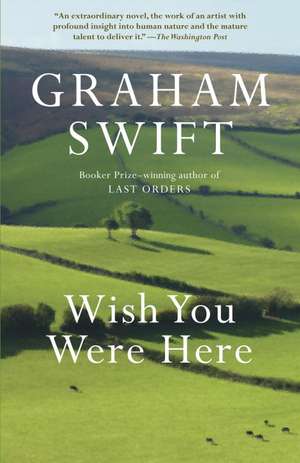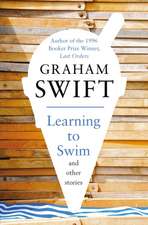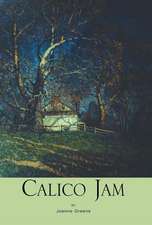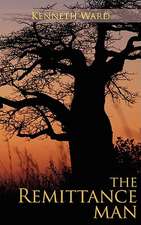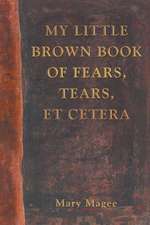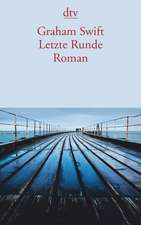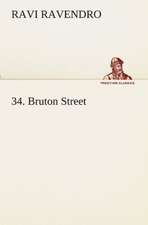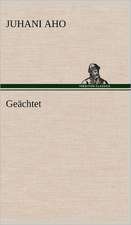Wish You Were Here
Autor Graham Swiften Limba Engleză Paperback – 21 ian 2013
On an autumn day in 2006, on the Isle of Wight, Jack Luxton—once a Devon farmer, now the proprietor of a seaside caravan park—receives the news that his brother, Tom, not seen for years, has been killed in combat in Iraq. For Jack and his wife, Ellie, this will have unexpected, far-reaching effects. For Jack in particular it means a crucial journey: to receive his brother’s remains and to confront his most secret, troubling memories.
A hauntingly intimate, deeply compassionate story about things that touch and test our human core, Wish You Were Here also looks, inevitably, to a wider, afflicted world. Moving toward a fiercely suspenseful climax, it brilliantly transforms the stuff of headlines into a heart-wrenching personal truth.
| Toate formatele și edițiile | Preț | Express |
|---|---|---|
| Paperback (2) | 59.65 lei 3-5 săpt. | +17.30 lei 7-13 zile |
| SCRIBNER UK – 19 sep 2018 | 59.65 lei 3-5 săpt. | +17.30 lei 7-13 zile |
| VINTAGE BOOKS – 21 ian 2013 | 107.92 lei 3-5 săpt. |
Preț: 107.92 lei
Nou
Puncte Express: 162
Preț estimativ în valută:
20.65€ • 22.50$ • 17.40£
20.65€ • 22.50$ • 17.40£
Carte disponibilă
Livrare economică 02-16 aprilie
Preluare comenzi: 021 569.72.76
Specificații
ISBN-13: 9780307744395
ISBN-10: 0307744396
Pagini: 319
Dimensiuni: 134 x 208 x 20 mm
Greutate: 0.26 kg
Editura: VINTAGE BOOKS
ISBN-10: 0307744396
Pagini: 319
Dimensiuni: 134 x 208 x 20 mm
Greutate: 0.26 kg
Editura: VINTAGE BOOKS
Recenzii
“An extraordinary novel, the work of an artist with profound insight into human nature and the mature talent to deliver it.” —The Washington Post
“Exquisite. . . . Beautifully made…[an] abundance of subtlety, tenderness and fluid prose.” —The New York Times Book Review
“Vivid, emotionally raw . . . Swift is a writer who clearly revels in dialogue and nuance. . . . Thoughtful and sensitive.” —The Boston Globe
“Mr. Swift's writing is as strong as ever, recalling the descriptive beauty of his highly acclaimed Waterland and Booker Award-winning Last Orders.” —Pittsburgh Post-Gazette
“As every truly great novelist does, in this new book, [Swift] demonstrates that perfect coordination between style and story. . . . [A] honed and driven story. Honestly, I can’t remember when I cared so passionately about how a novel might end.” —Ron Charles, The Washington Post
“Jamesian in sensibility and to some degree in style, [Swift] finds tragedy in the most ordinary conversation. . . . . You forget how piercing this sort of thing can be until you see Swift doing it so well, and with such patience. The depth of field in a Swift novel, thematically and emotionally, is vast. At his best, he suggests that looking intently at the smallest, most mundane thing can yield a glimpse into the meaning of life.” —The New York Times Book Review
“A rich, stereoscopic portrait of the book’s hero, Jack Luxton. . . . Swift knows that in reality we occupy a wealth of experiences, past and present, mundane and memorable. His strength in this fine novel is showing how all those experiences inescapably collide within us. As he puts it, "the place known as 'away from it all' simply doesn't exist." —Minneapolis Star-Tribune
“Heart-wrenching and gripping, Swift’s novel takes one man’s grief and uses it as a prism for the suffering of an entire nation.” —Mail on Sunday
“Part ghost story, part whodunit, part tour d’horizon of a nation that seems to have lost faith in tradition and history, it is also a deeply human tale about a man driven to the edge. Praise be for a serious novel that dares to look current affairs in the face.” —The Times (London)
“One of Swift’s most accomplished works yet. . . . A writerly novel that pushes us deep into the writer’s craft. . . . That Swift should be considered among the ranks of the literary greats is surely no longer in doubt.” —Culture Mob
“Magnificent . . . This is a substantial work, but not a sentence too long . . . Unafraid of emotion, though without a moment of sentimentality, Swift brilliantly conveys the confusion of a man and wife trapped by their unspoken fears.” —Sunday Herald (Scotland)
“With unmistakable echoes of Thomas Hardy and E.M. Forster. . . . He exercises a compelling mastery of tone and trajectory. . . . Emotionally gripping.” —The Times Literary Supplement
“Exquisite. . . . Beautifully made…[an] abundance of subtlety, tenderness and fluid prose.” —The New York Times Book Review
“Vivid, emotionally raw . . . Swift is a writer who clearly revels in dialogue and nuance. . . . Thoughtful and sensitive.” —The Boston Globe
“Mr. Swift's writing is as strong as ever, recalling the descriptive beauty of his highly acclaimed Waterland and Booker Award-winning Last Orders.” —Pittsburgh Post-Gazette
“As every truly great novelist does, in this new book, [Swift] demonstrates that perfect coordination between style and story. . . . [A] honed and driven story. Honestly, I can’t remember when I cared so passionately about how a novel might end.” —Ron Charles, The Washington Post
“Jamesian in sensibility and to some degree in style, [Swift] finds tragedy in the most ordinary conversation. . . . . You forget how piercing this sort of thing can be until you see Swift doing it so well, and with such patience. The depth of field in a Swift novel, thematically and emotionally, is vast. At his best, he suggests that looking intently at the smallest, most mundane thing can yield a glimpse into the meaning of life.” —The New York Times Book Review
“A rich, stereoscopic portrait of the book’s hero, Jack Luxton. . . . Swift knows that in reality we occupy a wealth of experiences, past and present, mundane and memorable. His strength in this fine novel is showing how all those experiences inescapably collide within us. As he puts it, "the place known as 'away from it all' simply doesn't exist." —Minneapolis Star-Tribune
“Heart-wrenching and gripping, Swift’s novel takes one man’s grief and uses it as a prism for the suffering of an entire nation.” —Mail on Sunday
“Part ghost story, part whodunit, part tour d’horizon of a nation that seems to have lost faith in tradition and history, it is also a deeply human tale about a man driven to the edge. Praise be for a serious novel that dares to look current affairs in the face.” —The Times (London)
“One of Swift’s most accomplished works yet. . . . A writerly novel that pushes us deep into the writer’s craft. . . . That Swift should be considered among the ranks of the literary greats is surely no longer in doubt.” —Culture Mob
“Magnificent . . . This is a substantial work, but not a sentence too long . . . Unafraid of emotion, though without a moment of sentimentality, Swift brilliantly conveys the confusion of a man and wife trapped by their unspoken fears.” —Sunday Herald (Scotland)
“With unmistakable echoes of Thomas Hardy and E.M. Forster. . . . He exercises a compelling mastery of tone and trajectory. . . . Emotionally gripping.” —The Times Literary Supplement
Notă biografică
Graham Swift lives in London and is the author of eight previous novels: The Sweet-Shop Owner; Shuttlecock, which received the Geoffrey Faber Memorial Prize; Waterland, which was short-listed for the Booker Prize and won The Guardian Fiction Award, the Winifred Holtby Memorial Prize, and the Italian Premio Grinzane Cavour; Out of This World; Ever After, which won the French Prix du Meilleur Livre Étranger; Last Orders, which was awarded the Booker Prize; The Light of Day; and, most recently, Tomorrow. He is also the author of Learning to Swim, a collection of short stories, and Making an Elephant, a non-fiction book. His work has been translated into more than thirty languages.
Extras
1
There is no end to madness, Jack thinks, once it takes hold. Hadn’t those experts said it could take years before it flared up in human beings? So, it had flared up now in him and Ellie.
Sixty-five head of healthy-seeming cattle that finally succumbed to the rushed-through culling order, leaving a silence and emptiness as hollow as the morning Mum died, and the small angry wisp of a thought floating in it: Well, they’d better be right, those experts, it had better damn well flare up some day or this will have been a whole load of grief for nothing.
So then.
Healthy cattle. Sound of limb and udder and hoof—and mind. “Not one of them mad as far as I ever saw,” Dad had said, as if it was the start of one of his rare jokes and his face would crack into a smile to prove it. But his face had looked like simply cracking anyway and staying cracked, and the words he might have said, by way of a punchline, never left his lips, though Jack thinks now that he heard them. Or it was his own silent joke to himself. Or it’s the joke he’s only arrived at now: “We must be the mad ones.”
And if ever there was a time when Jack’s dad might have put his two arms round his two sons, that was it. His arms were certainly long enough, even for his sons’ big shoulders—both brothers out of the same large Luxton mould, though with all of eight years between them. Tom would have been fifteen then, but growing fast. And Jack, though it was a fact he sometimes wished to hide, even to reverse, already had a clear inch over his father.
The three of them had stood there, like the only life left, in the yard at Jebb Farm.
But Michael Luxton hadn’t put his arms round his two sons. He’d done what he’d begun to do, occasionally, only after his wife’s death. He’d looked hard at his feet, at the ground he was standing on, and spat.
And Jack, who long ago took his last look at that yard, looks now from an upstairs window at a grey sea, at a sky full of wind-driven rain, but sees for a moment only smoke and fire.
Sixty-five head of cattle. Or, to reckon it another way (and never mind the promised compensation): ruin. Ruin, at some point in the not-so-distant future, the ruin that had been creeping up on them anyway since Vera Luxton had died.
Cattle going mad all over England. Or being shoved by the hundred into incinerators for the fear and the risk of it. Who would have imagined it? Who would have dreamed it? But cattle aren’t people, that’s a fact. And when trouble comes your way, at least you might think, though it’s small comfort and precious little help: Well, we’ve had our turn now, our share.
But years later, right here in this seaside cottage, Jack had switched on the TV and said, “Ellie, come and look at this. Come and look, quick.” It was the big pyre at Roak Moor, back in Devon. Thousands of stacked-up cattle, thousands more lying rotting in fields. The thing was burning day and night. The smoke would surely have been visible, over the far hills, from Jebb. Not to mention the smell being carried on the wind. And someone on the TV—another of those experts—was saying that burning these cattle might still release into the air significant amounts of the undetected agent of BSE. Though it was ten years on, and this time the burnings were for foot-and-mouth. Which people weren’t known to get. Yet.
“Well, Jack,” Ellie had said, stroking the back of his neck, “did we make a good move? Or did we make a good move?”
But he’d needed to resist the strange, opposite feeling: that he should have been there, back at Jebb, in the thick of it; it was his proper place.
BSE, then foot-and-mouth. What would have been the odds? Those TV pictures had looked like scenes from hell. Flames leaping up into the night. Even so, cattle aren’t people. Just a few months later Jack had turned on the telly once again and called to Ellie to come and look, as people must have been calling out, all over the world, to whoever was in the next room, “Drop what you’re doing and come and look at this.”
More smoke. Not over familiar, remembered hills, and even on the far side of the world. Though Jack’s first thought—or perhaps his second—had been the somehow entirely necessary and appropriate one: Well, we should be all right here. Here at the bottom of the Isle of Wight. And while the TV had seemed to struggle with its own confusion and repeated again and again, as if they might not be true, the same astonishing sequences, he’d stepped outside to look down at the site, as if half expecting everything to have vanished.
Thirty-two white units. All still there. And among them, on the grass, a few idle and perhaps still-ignorant human sprinkles. But inside each caravan was a television, and some of them must be switched on. The word must be spreading. In the Ship, in the Sands Cafe, it must be spreading. It was early September—late season—but the middle of a beautiful, clear, Indian-summer day, the sea a smooth, smiling blue. Until now at least, they would all have been congratulating themselves on having picked a perfect week.
He’d felt a surge of helpless responsibility, of protectiveness. He was in charge. What should he do—go down and calm them? In case they were panicking. Tell them it was all right? Tell them it was all right just to carry on their holidays, that was what they’d come for and had paid for and they shouldn’t let this spoil things, they should carry on enjoying themselves.
But his next thought—though perhaps it had really been his first and he’d pushed it aside, and it was less a thought maybe than a cold, clammy premonition—was: what might this mean for Tom?
He looks now at that same view from the bedroom window of Lookout Cottage, though the weather’s neither sunny nor calm. Clouds are charging over Holn Head. A November gale is careering up the Channel. The sea, white flecks in its greyness, seems to be travelling in a body from right to left, west to east, as if some retreat is going on. Rain stings the glass in front of him.
Ellie has been gone for over an hour—this weather yet to unleash itself when she left. She could be sitting out the storm somewhere, pulled up in the wind-rocked Cherokee. Reconsidering her options, perhaps. Or she could have done already exactly what she said she’d do, and be returning, having to take it slowly, headlights on in the blinding rain. Or returning—who knows?—behind a police car, with not just its headlights on, but its blue light flashing.
Reconsidering her options? But she made the move and said the words. The situation is plain to him now, and despite the blurring wind and rain, Jack’s mind is really quite clear. She had her own set of keys, of course. All she had to do was grab her handbag and walk out the door, but she might have remembered another set of keys that Jack certainly hasn’t forgotten. Has it occurred to her, even now? Ellie who was usually the one who thought things through, and him the slowcoach.
“Ellie,” Jack thinks. “My Ellie.”
He’s already taken the shotgun from the cabinet downstairs—the keys are in the lock—and brought it up here. It’s lying, loaded, on the bed behind him, on the white duvet. For good measure he has a box of twenty-five cartridges (some already in his pocket), in case of police cars, in case of mishaps. It’s the first time, Jack thinks, that he’s ever put a gun on a bed, let alone theirs, and that, by itself, has to mean something. As he peers through the window he can feel the weight of the gun behind him, making a dent in the duvet as if it might be some small, sleeping body.
Well, one way or another, they’d never gone down the road of children. There isn’t, now, that complication. He’s definitely the last of the Luxtons. There’s only one final complication—it involves Ellie—and he’s thought that through too, seriously and carefully.
Which is why he’s up here, at this rain-lashed window, from where he has the best view of the narrow, twisting road, Beacon Hill, which has no other purpose these days than to lead to this cottage. So he’ll be alerted. So he’ll be able to see, just a little sooner than from downstairs, the dark-blue roof, above the high bank, then the nose of the Cherokee as it takes the first, tight, ascending bend, past the old chapel. The Cherokee that’s done so much hard journeying in these last three days.
The road below him, running with water, seems to slither.
Of course, she might not return at all. Another option, and one she might be seriously contemplating. Though where the hell else does she have to go to?
It’s all gone mad, Jack thinks, but part of him has never felt saner. Rain blurs the window, but he looks through it at the rows of buffeted caravans in the middle distance to the right, beyond the spur of land that slopes down beneath him to the low mass of the Head. All empty now, of course, for the winter.
“Well, at least this has happened in the off season.”
Ellie’s words, and just for a shameful instant it had been his own secret flicker of a thought as well.
He looks at the caravans and even now feels their tug, like the tug of the wind on their own thin, juddering frames. Thirty-two trembling units. To the left, the locked site office, the laundrette, the empty shop—grille down, window boarded. The gated entrance-way off the Sands End road, the sign above it swinging.
Even now, especially now, he feels the tug. The Lookout Caravan Park, named after this cottage (or two knocked into one), in turn named after its former use. He feels, himself now, like some desperate coastguard. Ellie had said they should change the name from the Sands. He’d said they should keep it, for the good will and the continuity. And so they had, for a year. But Ellie was all for them making their own mark and wiping out what was past. There must be no end of caravan sites called the Sands, she’d said, but the Lookout would stand out.
It could work two ways, he’d said, “Lookout”—attempting another of those solemn-faced jokes of the kind his father once made.
Ellie had shrugged. So, didn’t he like the name of the cottage? It wasn’t the name they’d given it, after all. Lookout Cottage (usually known as just “The Lookout”). They could always change the name of the cottage. Ellie was all for change. She was his wife now. She’d laughed—she’d changed her name to Luxton.
But they hadn’t. Perhaps they should have done. And before the new season began, for the sake of uniformity but also novelty, and because Ellie thought it sounded better than the Sands, the site had become, on the letterhead and the brochure and on the sign over the gate, as well as in plain fact, the Lookout Park.
And it was lookout time now all right.
There is no end to madness, Jack thinks, once it takes hold. Hadn’t those experts said it could take years before it flared up in human beings? So, it had flared up now in him and Ellie.
Sixty-five head of healthy-seeming cattle that finally succumbed to the rushed-through culling order, leaving a silence and emptiness as hollow as the morning Mum died, and the small angry wisp of a thought floating in it: Well, they’d better be right, those experts, it had better damn well flare up some day or this will have been a whole load of grief for nothing.
So then.
Healthy cattle. Sound of limb and udder and hoof—and mind. “Not one of them mad as far as I ever saw,” Dad had said, as if it was the start of one of his rare jokes and his face would crack into a smile to prove it. But his face had looked like simply cracking anyway and staying cracked, and the words he might have said, by way of a punchline, never left his lips, though Jack thinks now that he heard them. Or it was his own silent joke to himself. Or it’s the joke he’s only arrived at now: “We must be the mad ones.”
And if ever there was a time when Jack’s dad might have put his two arms round his two sons, that was it. His arms were certainly long enough, even for his sons’ big shoulders—both brothers out of the same large Luxton mould, though with all of eight years between them. Tom would have been fifteen then, but growing fast. And Jack, though it was a fact he sometimes wished to hide, even to reverse, already had a clear inch over his father.
The three of them had stood there, like the only life left, in the yard at Jebb Farm.
But Michael Luxton hadn’t put his arms round his two sons. He’d done what he’d begun to do, occasionally, only after his wife’s death. He’d looked hard at his feet, at the ground he was standing on, and spat.
And Jack, who long ago took his last look at that yard, looks now from an upstairs window at a grey sea, at a sky full of wind-driven rain, but sees for a moment only smoke and fire.
Sixty-five head of cattle. Or, to reckon it another way (and never mind the promised compensation): ruin. Ruin, at some point in the not-so-distant future, the ruin that had been creeping up on them anyway since Vera Luxton had died.
Cattle going mad all over England. Or being shoved by the hundred into incinerators for the fear and the risk of it. Who would have imagined it? Who would have dreamed it? But cattle aren’t people, that’s a fact. And when trouble comes your way, at least you might think, though it’s small comfort and precious little help: Well, we’ve had our turn now, our share.
But years later, right here in this seaside cottage, Jack had switched on the TV and said, “Ellie, come and look at this. Come and look, quick.” It was the big pyre at Roak Moor, back in Devon. Thousands of stacked-up cattle, thousands more lying rotting in fields. The thing was burning day and night. The smoke would surely have been visible, over the far hills, from Jebb. Not to mention the smell being carried on the wind. And someone on the TV—another of those experts—was saying that burning these cattle might still release into the air significant amounts of the undetected agent of BSE. Though it was ten years on, and this time the burnings were for foot-and-mouth. Which people weren’t known to get. Yet.
“Well, Jack,” Ellie had said, stroking the back of his neck, “did we make a good move? Or did we make a good move?”
But he’d needed to resist the strange, opposite feeling: that he should have been there, back at Jebb, in the thick of it; it was his proper place.
BSE, then foot-and-mouth. What would have been the odds? Those TV pictures had looked like scenes from hell. Flames leaping up into the night. Even so, cattle aren’t people. Just a few months later Jack had turned on the telly once again and called to Ellie to come and look, as people must have been calling out, all over the world, to whoever was in the next room, “Drop what you’re doing and come and look at this.”
More smoke. Not over familiar, remembered hills, and even on the far side of the world. Though Jack’s first thought—or perhaps his second—had been the somehow entirely necessary and appropriate one: Well, we should be all right here. Here at the bottom of the Isle of Wight. And while the TV had seemed to struggle with its own confusion and repeated again and again, as if they might not be true, the same astonishing sequences, he’d stepped outside to look down at the site, as if half expecting everything to have vanished.
Thirty-two white units. All still there. And among them, on the grass, a few idle and perhaps still-ignorant human sprinkles. But inside each caravan was a television, and some of them must be switched on. The word must be spreading. In the Ship, in the Sands Cafe, it must be spreading. It was early September—late season—but the middle of a beautiful, clear, Indian-summer day, the sea a smooth, smiling blue. Until now at least, they would all have been congratulating themselves on having picked a perfect week.
He’d felt a surge of helpless responsibility, of protectiveness. He was in charge. What should he do—go down and calm them? In case they were panicking. Tell them it was all right? Tell them it was all right just to carry on their holidays, that was what they’d come for and had paid for and they shouldn’t let this spoil things, they should carry on enjoying themselves.
But his next thought—though perhaps it had really been his first and he’d pushed it aside, and it was less a thought maybe than a cold, clammy premonition—was: what might this mean for Tom?
He looks now at that same view from the bedroom window of Lookout Cottage, though the weather’s neither sunny nor calm. Clouds are charging over Holn Head. A November gale is careering up the Channel. The sea, white flecks in its greyness, seems to be travelling in a body from right to left, west to east, as if some retreat is going on. Rain stings the glass in front of him.
Ellie has been gone for over an hour—this weather yet to unleash itself when she left. She could be sitting out the storm somewhere, pulled up in the wind-rocked Cherokee. Reconsidering her options, perhaps. Or she could have done already exactly what she said she’d do, and be returning, having to take it slowly, headlights on in the blinding rain. Or returning—who knows?—behind a police car, with not just its headlights on, but its blue light flashing.
Reconsidering her options? But she made the move and said the words. The situation is plain to him now, and despite the blurring wind and rain, Jack’s mind is really quite clear. She had her own set of keys, of course. All she had to do was grab her handbag and walk out the door, but she might have remembered another set of keys that Jack certainly hasn’t forgotten. Has it occurred to her, even now? Ellie who was usually the one who thought things through, and him the slowcoach.
“Ellie,” Jack thinks. “My Ellie.”
He’s already taken the shotgun from the cabinet downstairs—the keys are in the lock—and brought it up here. It’s lying, loaded, on the bed behind him, on the white duvet. For good measure he has a box of twenty-five cartridges (some already in his pocket), in case of police cars, in case of mishaps. It’s the first time, Jack thinks, that he’s ever put a gun on a bed, let alone theirs, and that, by itself, has to mean something. As he peers through the window he can feel the weight of the gun behind him, making a dent in the duvet as if it might be some small, sleeping body.
Well, one way or another, they’d never gone down the road of children. There isn’t, now, that complication. He’s definitely the last of the Luxtons. There’s only one final complication—it involves Ellie—and he’s thought that through too, seriously and carefully.
Which is why he’s up here, at this rain-lashed window, from where he has the best view of the narrow, twisting road, Beacon Hill, which has no other purpose these days than to lead to this cottage. So he’ll be alerted. So he’ll be able to see, just a little sooner than from downstairs, the dark-blue roof, above the high bank, then the nose of the Cherokee as it takes the first, tight, ascending bend, past the old chapel. The Cherokee that’s done so much hard journeying in these last three days.
The road below him, running with water, seems to slither.
Of course, she might not return at all. Another option, and one she might be seriously contemplating. Though where the hell else does she have to go to?
It’s all gone mad, Jack thinks, but part of him has never felt saner. Rain blurs the window, but he looks through it at the rows of buffeted caravans in the middle distance to the right, beyond the spur of land that slopes down beneath him to the low mass of the Head. All empty now, of course, for the winter.
“Well, at least this has happened in the off season.”
Ellie’s words, and just for a shameful instant it had been his own secret flicker of a thought as well.
He looks at the caravans and even now feels their tug, like the tug of the wind on their own thin, juddering frames. Thirty-two trembling units. To the left, the locked site office, the laundrette, the empty shop—grille down, window boarded. The gated entrance-way off the Sands End road, the sign above it swinging.
Even now, especially now, he feels the tug. The Lookout Caravan Park, named after this cottage (or two knocked into one), in turn named after its former use. He feels, himself now, like some desperate coastguard. Ellie had said they should change the name from the Sands. He’d said they should keep it, for the good will and the continuity. And so they had, for a year. But Ellie was all for them making their own mark and wiping out what was past. There must be no end of caravan sites called the Sands, she’d said, but the Lookout would stand out.
It could work two ways, he’d said, “Lookout”—attempting another of those solemn-faced jokes of the kind his father once made.
Ellie had shrugged. So, didn’t he like the name of the cottage? It wasn’t the name they’d given it, after all. Lookout Cottage (usually known as just “The Lookout”). They could always change the name of the cottage. Ellie was all for change. She was his wife now. She’d laughed—she’d changed her name to Luxton.
But they hadn’t. Perhaps they should have done. And before the new season began, for the sake of uniformity but also novelty, and because Ellie thought it sounded better than the Sands, the site had become, on the letterhead and the brochure and on the sign over the gate, as well as in plain fact, the Lookout Park.
And it was lookout time now all right.
Descriere
Descriere de la o altă ediție sau format:
An intensely moving and beautifully written novel from the Booker-prize winning author of Last Orders, and Mothering Sunday
